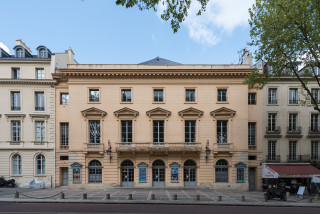This week in Versailles
Théâtre Montansier - La Révolte
From Thursday 05 to Saturday 07 February 2026
Thursday, Friday, Saturday
20:30 to 22:00
Location : Théâtre Montansier
Destination
13 Rue des Réservoirs
78000
Versailles
GPS coordinates
Latitude : 48.808077
Longitude : 2.12423
Event Organizer
Théâtre Montansier
Location
Théâtre Montansier
13 Rue des Réservoirs
78000
Versailles
Presentation
"As a bookkeeper, you're an excellent accountant; as a wife, I hear you're very good and not stupid at all, which is something. Finally, as a hard-working character, you exceed my expectations.
And if I've tripled my fortune, I can say it's thanks to you. But Elisabeth no longer wants to look like this. As their daughter sleeps in her room, she claims, without raising her voice, the right to slam the door on the home and go off to live in the country.
The power of the denunciation in “La Révolte” lies in the fact that the woman does not leave her husband for another man. It's not a question of freedom of love, romance or adultery: it's a rupture of conviction.
A matter of life and death. Elisabeth leaves. Her life is not in line with her deepest aspirations. The whole of her being is violently opposed to bourgeois society, its lack of honesty in business, its exclusive pursuit of profit.
A woman of duty.
Set in “modern” Paris, in the home of Félix and Elisabeth.
It's midnight.
Work has gone on late. It's dark and cold.
Elisabeth is a woman of duty.
Faithful, submissive and thrifty wife, exemplary mother.
She has a good head for business, and does much more than assist her banker husband.
And now she's telling Félix that she's leaving her home, her settled life and her family.
She is leaving.
She's planned everything, sent the servants away, ordered a car, the luggage is ready...
But... will she be able to follow through on her great aspiration?
By Villiers de L'Isle Adam, directed by Gilles Bouillon, dramaturgy by Bernard Pico with Nine De Montal, Mathias Maréchal.
Cie Gilles Bouillon.
The power of the denunciation in “La Révolte” lies in the fact that the woman does not leave her husband for another man. It's not a question of freedom of love, romance or adultery: it's a rupture of conviction.
A matter of life and death. Elisabeth leaves. Her life is not in line with her deepest aspirations. The whole of her being is violently opposed to bourgeois society, its lack of honesty in business, its exclusive pursuit of profit.
A woman of duty.
Set in “modern” Paris, in the home of Félix and Elisabeth.
It's midnight.
Work has gone on late. It's dark and cold.
Elisabeth is a woman of duty.
Faithful, submissive and thrifty wife, exemplary mother.
She has a good head for business, and does much more than assist her banker husband.
And now she's telling Félix that she's leaving her home, her settled life and her family.
She is leaving.
She's planned everything, sent the servants away, ordered a car, the luggage is ready...
But... will she be able to follow through on her great aspiration?
By Villiers de L'Isle Adam, directed by Gilles Bouillon, dramaturgy by Bernard Pico with Nine De Montal, Mathias Maréchal.
Cie Gilles Bouillon.
Pics
Pics
We also suggest...





